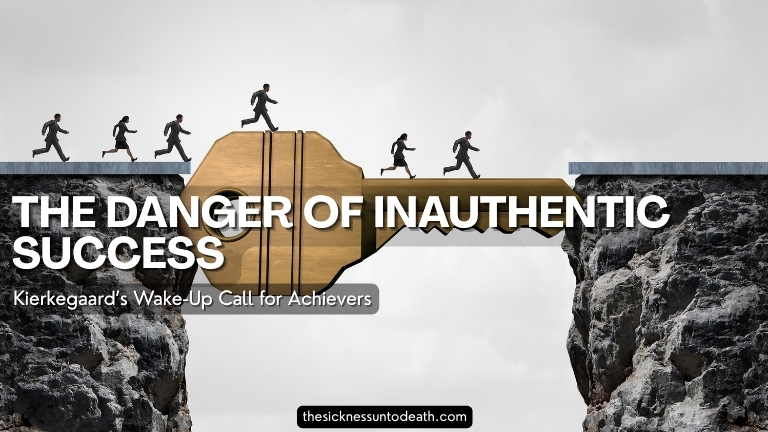Reflect on how chasing societal definitions of success can lead to despair, and how faith redefines what it means to live well.
We’re told to chase success.
Climb the ladder. Build the brand. Hit the milestones.
From school to career to social media, the message is clear: achieve more, be more, impress more.
And yet… for many high achievers, something starts to feel off.
They hit the goals. They get the recognition.
But deep down, there’s a quiet question echoing:
Is this it?
Søren Kierkegaard saw this coming long before the age of personal branding and LinkedIn metrics. The 19th-century Danish philosopher warned that success without selfhood is a trap—one that leads not to fulfilment, but to despair.
The Hollow Triumph
In The Sickness Unto Death, Kierkegaard writes about despair not as a dramatic collapse, but as a subtle disconnection from one’s true self. And one of the most dangerous forms of despair? The kind that looks like success.
“The greatest hazard of all—losing one’s self—can occur very quietly in the world, as if it were nothing at all.”
Many people lose themselves not in failure, but in achievement. They become so busy building a version of themselves that pleases others, they forget who they truly are.
When Success Isn’t Aligned with the Soul
You can have everything that “should” make you happy—career, reputation, wealth, respect—and still feel strangely empty.
Kierkegaard would call this inauthentic success: the kind built on societal expectations rather than spiritual grounding. It’s success that looks impressive on the outside but leaves the inner life neglected or unknown.
And the longer we ignore that inner ache, the louder the despair becomes.
A Faith-Filled Redefinition
Kierkegaard believed that true success is becoming the person God created you to be—not just achieving, but aligning. Not just climbing, but becoming. And that’s a radically different metric.
Faith invites us to stop measuring ourselves by the world’s standards and start living with integrity, purpose, and inward truth.
This doesn’t mean giving up on goals. But it does mean asking deeper questions:
- Does this goal align with who I’m truly called to be?
- Am I living for applause, or for meaning?
Do my outward achievements match my inward values?
Integrity Over Image
Kierkegaard wasn’t against ambition—but he challenged us to examine what’s driving it. Are we chasing success to prove our worth, to escape discomfort, or to keep up appearances?
Or are we building a life that’s rooted in something eternal?
When success is no longer about ego, but about faithfulness—everything changes.
Final Thoughts: A Better Way to Live Well
There’s nothing wrong with achievement. But if we gain the world and lose ourselves in the process, we’ve missed the point.
Kierkegaard’s wake-up call isn’t meant to shame us—it’s meant to free us. To help us trade hollow ambition for real purpose. To pursue a life that’s not just impressive, but honest. Whole. Anchored.
You don’t have to abandon success. But you can redefine it.
Not by what you’ve done, but by who you’re becoming.
Go Deeper
📖 Visit www.thesicknessuntodeath.com
Explore a modern, accessible translation of Kierkegaard’s The Sickness Unto Death, where he unpacks the inner struggle behind worldly achievement and calls us back to a more honest, faithful life.
If you’ve ever felt like you’re “winning” on the outside but wondering what’s missing underneath—this is for you.
You’re not alone. And you’re not too far gone to begin again—this time, with your soul intact.

